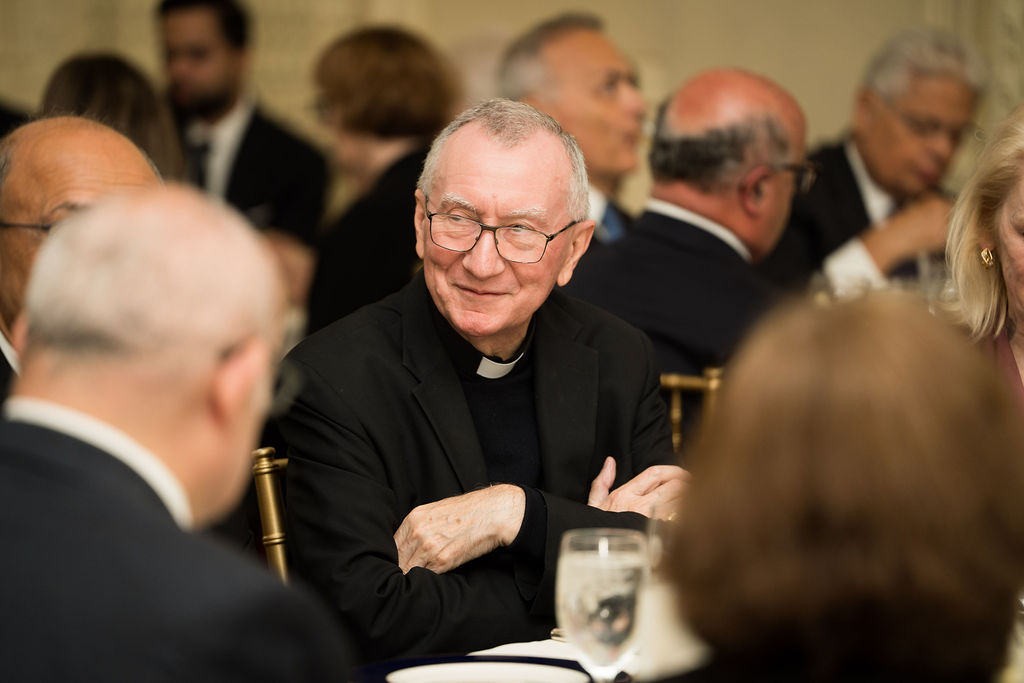Address by His Eminence Cardinal Pietro Parolin
Secretary of State to CAPP-USA, September 2024
AI Ethics
Artificial Intelligence: Ethical Considerations and the Catholic Church’s Perspective

Cardinal Parolin to CAPP-USA regarding the Catholic Church’s perspective on AI ethics.
The rapid advancement of artificial intelligence has ushered in an era of unprecedented technological progress, bringing with it both immense potential and profound ethical challenges. This evening, I would like to share with you some reflections from the Catholic Church’s perspective on AI and its implications for our society.
The Promise and Perils of AI
Artificial intelligence has evolved far beyond its initial conception as a mere tool for automation. Today, we witness AI systems capable of replicating human cognitive capacities, even venturing into realms once thought to be exclusively human, such as creativity and decision-making. This remarkable progress brings with it a host of ethical concerns, particularly regarding the need for regulatory measures and the role of human oversight.
As AI continues to permeate various aspects of our lives, from the private sector to public discourse, we must remain vigilant. The emergence of AI-generated content in areas as personal as faith, exemplified by AIproduced sermons and homilies, underscores the urgency of ensuring that AI remains a tool in the service of humanity rather than a force that supplants human agency and creativity.
The Church’s Role in AI Ethics
The Catholic Church, with its unwavering commitment to human dignity, is compelled to engage with these developments. Pope John Paul II foresaw the potential risks associated with technological advancements, including the possibility of widespread unemployment. However, he maintained an optimistic outlook with regard to humanity’s capacity to regulate and adapt to such transformations.
In recent years, the Church has taken concrete steps to address the ethical use of AI. The 2020 “Rome Call for AI Ethics,” developed in collaboration with organizations like FAO, Microsoft, and IBM, emphasizes that AI should serve as an instrument to augment human creativity rather than compete with it. It is the Church’s responsibility to provide guidance on the ethical use of AI, ensuring that it promotes human dignity, social justice, and the common good.
AI and World Peace
Pope Francis, in his 2024 World Peace Day message, highlighted the potential of AI in fostering global harmony. He reminded us that human intelligence reflects the dignity bestowed by our Creator, enabling us to harness science and technology as expressions of our creative potential. The Pope emphasized that AI development should be guided by a commitment to human dignity and fraternity, not solely by financial gain or political expediency.
Heeding this, we must also address the concentration of AI development in the hands of a few powerful corporations. This consolidation of resources, data, and talent poses serious risks to democracy and global equality. It is imperative that we strive to ensure that the benefits of AI are distributed equitably across all societies, with particular attention to the most vulnerable among us.
Implications for War and Disarmament
The application of AI in warfare presents significant ethical challenges. The development of Lethal Autonomous Weapons Systems (LAWS) represents a profound shift in the exercise of military power. These AI-driven weapons, capable of making life-and-death decisions without human intervention, raise serious moral concerns. Machines lack the capacity for moral judgment inherent to the human condition, yet they can perform military functions with deadly efficiency.
Since 2014, the Holy See has been actively engaged in efforts to address the ethical and legal implications of LAWS, advocating for international
regulations to prevent their uncontrolled development. The Church maintains that only humans possess the moral capacity to evaluate the consequences of their actions, and technology should never replace human judgment in matters of life and death.
Multilateral Diplomacy and AI Governance
The Holy See continues to advocate for international cooperation on AI governance. At the 2021 Review Conference on Conventional Weapons, the Holy See proposed an international body dedicated to the ethical oversight of AI in military contexts. This proposal aligns with the growing recognition that AI is not just a national issue but a global one, requiring multilateral efforts to ensure its responsible use.
Pope Francis has emphasized that the global scale of AI necessitates coordinated international action. Indeed, he has called for multilateral agreements and their enforcement through international organizations, ensuring that AI development serves the cause of human fraternity and peace.
Challenges and Open Questions
As we move forward, many questions remain unanswered. We must explore the attribution of responsibility for decisions made using AI systems. We need to establish incentives and regulations that encourage ethical innovation while preventing negative consequences. The education and communication sectors must collaborate to increase knowledge and awareness of AI’s proper use, equipping future generations with critical thinking skills.
We must also evaluate AI’s impact on employment, calling for retraining and facilitating job transitions. The security and privacy implications of AI require careful examination, as do its effects on people’s cognitive abilities, behaviour, and relationships. Lastly, we must consider the environmental impact of AI development, particularly its significant energy consumption, in the context of the global energy transition.
Conclusion
In conclusion, let us heed the words of Pope Francis: “The future of the economy, civilization, and humanity itself is being shaped by technological innovation. We must not pass up the chance to think and act in a new way, using our minds, our hearts, and our hands to steer innovation towards a model that gives priority to human dignity.” (Pope Francis)
As we navigate this new era of Artificial Intelligence, let us remain committed to ensuring that technological progress serves the common good, protects the most vulnerable, and upholds the inherent dignity of every human being. Together, we can shape a future where AI enhances our humanity rather than diminishes it, fostering a world of greater understanding, equality, and peace. “For this reason, I expressed my hope that the Centesimus Annus Foundation will continue its efforts to address this issue.” (Pope Francis)
Thank you.





